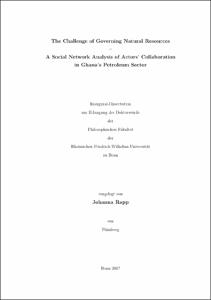Rapp, Johanna: The Challenge of Governing Natural Resources : A Social Network Analysis of Actors’ Collaboration in Ghana’s Petroleum Sector. - Bonn, 2017. - Dissertation, Rheinische Friedrich-Wilhelms-Universität Bonn.
Online-Ausgabe in bonndoc: https://nbn-resolving.org/urn:nbn:de:hbz:5-47593
Online-Ausgabe in bonndoc: https://nbn-resolving.org/urn:nbn:de:hbz:5-47593
@phdthesis{handle:20.500.11811/7064,
urn: https://nbn-resolving.org/urn:nbn:de:hbz:5-47593,
author = {{Johanna Rapp}},
title = {The Challenge of Governing Natural Resources : A Social Network Analysis of Actors’ Collaboration in Ghana’s Petroleum Sector},
school = {Rheinische Friedrich-Wilhelms-Universität Bonn},
year = 2017,
month = jul,
note = {The PhD thesis investigates the extent of collaboration among actors in Ghana’s petroleum sector. Previous research has either focused on the socio-economic changes enforced upon local communities in close proximity to the offshore petroleum fields, or on the institutional framework that aims to govern the petroleum industry. While the first strand of literature criticizes the negative impacts on local communities, analyses of the second strand overwhelmingly praise Ghana as a role model for “good” petroleum governance as the government aims to include non-state actors as advisory and controlling bodies in resource governance. In development literature and international development collaboration, such multi-actor approaches are argued to increase the effectiveness in governing natural resources and to better address communities’ interests considering the role of non-state actors as citizens’ representatives beyond the state.
Yet, so far, a conceptual argument why state and non-state actors should collaborate and an empirical investigation how they collaborate are outstanding. At the same time, it remains unclear which actors involved in petroleum governance are perceived as representatives by affected communities. My thesis is a first attempt to address these gaps. Based on exchange theory, the thesis scrutinizes which actors in Ghana’s petroleum sector (aim to) steer petroleum resources and deriving revenues, which of these actors affected communities perceive as representatives of their interests and to what extent these actors attain their proclaimed goal to collaboratively govern the petroleum sector.
The analysis of two novel data sets tackle these questions. Primary survey data compiled with 333 expropriated land owners and farmers are used to investigate the abilities of petroleum actors to represent affected communities’ interests. The extent of collaboration among petroleum actors is methodically appropriated with Social Network Analysis (SNA). The necessary network data were generated by the means of a structured questionnaire testing six different means of collaboration among 29 actors from the public, private, donor, traditional, civil society and media sector.
Based on the triangulation of qualitative and quantitative data analysis, I argue that effective representation and collaboration is constrained by an executive dominance, a deviation between communities’ interests and actors’ goals in petroleum governance, contestation rather than collaboration among non-state actors, and a lack of long-term, collaborative strategies among all actors. Hence, while Ghana is far from experiencing the devastating consequences of the so-called “resource curse”, actors so far fall short of their objective to jointly govern the petroleum sector.},
url = {https://hdl.handle.net/20.500.11811/7064}
}
urn: https://nbn-resolving.org/urn:nbn:de:hbz:5-47593,
author = {{Johanna Rapp}},
title = {The Challenge of Governing Natural Resources : A Social Network Analysis of Actors’ Collaboration in Ghana’s Petroleum Sector},
school = {Rheinische Friedrich-Wilhelms-Universität Bonn},
year = 2017,
month = jul,
note = {The PhD thesis investigates the extent of collaboration among actors in Ghana’s petroleum sector. Previous research has either focused on the socio-economic changes enforced upon local communities in close proximity to the offshore petroleum fields, or on the institutional framework that aims to govern the petroleum industry. While the first strand of literature criticizes the negative impacts on local communities, analyses of the second strand overwhelmingly praise Ghana as a role model for “good” petroleum governance as the government aims to include non-state actors as advisory and controlling bodies in resource governance. In development literature and international development collaboration, such multi-actor approaches are argued to increase the effectiveness in governing natural resources and to better address communities’ interests considering the role of non-state actors as citizens’ representatives beyond the state.
Yet, so far, a conceptual argument why state and non-state actors should collaborate and an empirical investigation how they collaborate are outstanding. At the same time, it remains unclear which actors involved in petroleum governance are perceived as representatives by affected communities. My thesis is a first attempt to address these gaps. Based on exchange theory, the thesis scrutinizes which actors in Ghana’s petroleum sector (aim to) steer petroleum resources and deriving revenues, which of these actors affected communities perceive as representatives of their interests and to what extent these actors attain their proclaimed goal to collaboratively govern the petroleum sector.
The analysis of two novel data sets tackle these questions. Primary survey data compiled with 333 expropriated land owners and farmers are used to investigate the abilities of petroleum actors to represent affected communities’ interests. The extent of collaboration among petroleum actors is methodically appropriated with Social Network Analysis (SNA). The necessary network data were generated by the means of a structured questionnaire testing six different means of collaboration among 29 actors from the public, private, donor, traditional, civil society and media sector.
Based on the triangulation of qualitative and quantitative data analysis, I argue that effective representation and collaboration is constrained by an executive dominance, a deviation between communities’ interests and actors’ goals in petroleum governance, contestation rather than collaboration among non-state actors, and a lack of long-term, collaborative strategies among all actors. Hence, while Ghana is far from experiencing the devastating consequences of the so-called “resource curse”, actors so far fall short of their objective to jointly govern the petroleum sector.},
url = {https://hdl.handle.net/20.500.11811/7064}
}






